


 |
||
 |
||
 |
||
Vol. 13 (1): June 2010 |
||
Croatia / Greece / Mauritania & Western Sahara / Turkey
Mauritania & Western Sahara
|
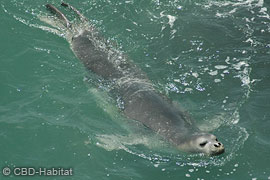 |
|
|
|
As is the practice every year, at the beginning of 2010 the CBD-Habitat catalogue of the monk seal colony of the Cabo Blanc peninsula was updated with photographs obtained from the annual photo-identification campaign and from the images obtained from the recordings of the video-monitoring system during 2009.
Following the revision the monk seal catalogue now features a total of 156 files of subadults and adults (66 females, 61 males and 24 of undetermined sex). Comparing the results with previous years and taking into account the high recapture rates of the animals and the high level of monitoring effort, we can see a clear rising trend in the population dynamics evolution that makes us optimistic about the colony’s recovery and the protection measures already established. – Mercedes Muñoz and Miguel A.Cedenilla, CBD-Habitat.
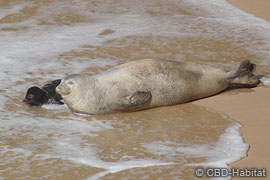 |
|
|
|
In the previous issue of The Monachus Guardian [Towards a 50-pup annual birth rate, TMG 12(2): November 2009], we reported that the number of pups born during 2009 at that point was 48. We added that, with more births expected, 2009 productivity might even reach the 50 births barrier.
With the 2009 results now in, we can announce with enthusiasm that the number of pups born was 51, breaking the last record set in 2006, when the baby boom rose the average productivity from 26 to 48 [Notable increase of newborn pups at Cabo Blanco in 2006, TMG 9(2): November 2006].
This last year (2009) the breeding season began in May and the maximum number of births took place between September and October, with 13 and 14 births respectively. – Miguel A. Cedenilla, Moulaye O. Haye and Anna Varea, CBD-Habitat.
Under a project co-funded by the Spanish Agency for International Cooperation (AECID) and the MAVA Foundation, CBD-Habitat signed a collaboration agreement with the National School of Fisheries of Mauritania (ENEMP), in order to introduce to their training Curriculum a course on sustainable and responsible fisheries. This school is responsible for the 2 year training of the future officers of the industrial fishing fleet, as well as shorter courses on different topics for artisanal fishermen.
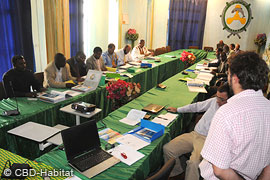 |
|
|
Teachers training at the ENEMP. |
Until now, responsible and sustainable fisheries, as well as other important aspects related to the impact of human activities on the marine ecosystem, had not been part of the School's Curriculum, which focused mainly on exploitation and operation techniques. This has now been remedied. Several outside experts, together with the staff of the School, designed and developed the contents of this Curriculum subject, including the following aspects: marine pollution, marine biology and ecology, and responsible and sustainable fisheries. Several educational tools were designed to support teachers in their task of transmitting this knowledge to their students. These included PowerPoint presentations, leaflets, brochures, posters, TV documentaries and also a 30-minute video on environmental awareness for the fisheries sector. Finally numerous sources and bibliographic references were provided to contribute to the Library of the School on these issues.
All these materials were introduced during the one week training period developed for the teachers of the ENEMP, so they could familiarise themselves with them and prepare for the new subject they will have to teach in the future. – Ana Maroto, Hamdi M’Barek and Pablo Fernández de Larrinoa, CBD-Habitat.
La mer n’est pas une poubelle! Poster (French and Arabic). [PDF  2 MB]
2 MB]
La mer n’est pas une poubelle! Pamphlet (French and Arabic). [PDF  6.2 MB]
6.2 MB]
Que pecherez-vous demain? Poster (French and Arabic). [PDF  430 KB]
430 KB]
Under the collaboration agreement established between CBD-Habitat and the National Park of Banc D’Arguin, several courses on responsible fishing and marine pollution were conducted for the artisanal fishermen of the area. More than 300 fishermen benefited from these courses that generated intense debate about the role of marine reserves, minimum sizes, biological impacts, etc. Informative materials, edited in collaboration with the National School of Fisheries of Mauritania (ENEMP), were distributed to support the training courses.
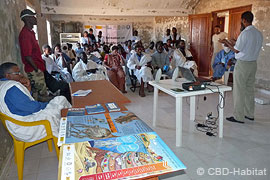 |
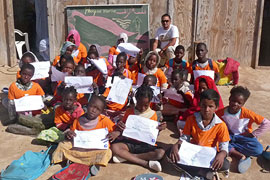 |
|
|
Artisanal fishermen attending the course at the Banc d'Arguin National Park. |
Children participated in environmental awareness activities in nearby schools. |
At the same time, talks on the conservation of the marine environment were developed for the kids of the 3 Park schools.
Environmental awareness activities were conducted in each school, each featuring a storytelling performance, the screening of a documentary and the holding of a lecture and discussion on the environment. The course was designed this way to hold the attention of children and to allow them to reflect and give advice on preserving the environment. – Hamdi M’Barek and Ana Maroto, CBD-Habitat.
Code de bonnes pratiques pour une pêche responsible (in French): 1-36. [PDF  7.6 MB]
7.6 MB]
Code de conduite pour une pêche responsible de la FAO (in French and Arabic): 1-12. [PDF  7.2 MB]
7.2 MB]
 |
|
|
On 18-20 November 2009, the fifth meeting of the Mediterranean Monk Seal Atlantic Action Plan working group took place in the village of Iwik, in the National Park of Banc d’Arguin (Mauritania). Representatives of the members of the range states, the Convention on Migratory Species (CMS) and outside observers from the Regional Program for the Conservation of the Marine and Coastal Environment of Western Africa (PRCM) attended.
The status of the Action Plan in the four countries was updated, as well as information on the progressive recovery of the two remaining monk seal populations in the Atlantic, and the advances in the satellite monitoring project. Afterwards, the participants discussed such issues as governance of the Action Plan following the signature of the Memorandum of Understanding, as well as new short and medium term conservation priorities, mainly the reinforcement of the protected areas of the Atlantic range. – Pablo Fernández de Larrinoa, CBD-Habitat.
Mediterranean News continues with Turkey...
Copyright © 2010 The Monachus Guardian. All Rights Reserved |